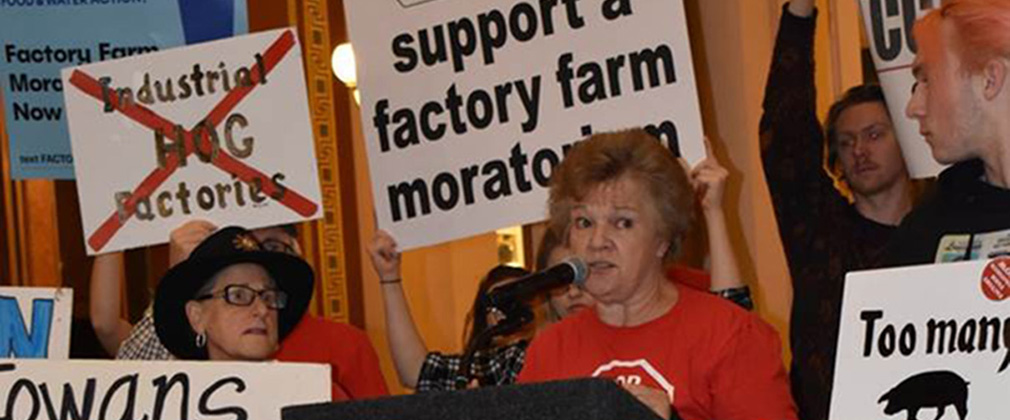Support for Iowa Moratorium on Hog Confinement Operations
DES MOINES—Feb. 11, 2020. For the third year in a row, advocates in Iowa are drumming up support for a bill that would halt the expansion of the industrial hog confinement industry in the state. Iowa is home to 3 million people and 23 million hogs, and the manure produced by the industry is overwhelming the state’s ecosystems. Runoff from swine production operations—manure, to be clear—is so serious that half of Iowa’s waterways have been declared “impaired” by the state’s Department of Natural Resources. In 2017, the Des Moines Water Works claimed the industry funneled an overload of nitrates into a main drinking water source for the city.
The hog industry is ruining Iowa’s rural communities, as well, driving out small and medium-sized businesses through consolidation and vertical integration—small businesses can’t compete with the monopolies. Adding to rural communities’ despair are the stench, the allergens, and the plummeting property values, all of which can be traced to the dominance of corporate hog operations.
On February 11, the Johns Hopkins Center for a Livable Future’s Bob Martin shared data from a recent CLF poll with Iowa legislators as it considered a bill to stop the creation of new confined animal feeding operations, also known as CAFOs, and halt the expansion of existing CAFOs. The CLF poll showed that a majority of Americans support greater oversight of industrial animal agriculture. In addition, 43 percent of those surveyed nationally say they favor a national ban on the creation of new CAFOs.
The proposed bill, HF 2127, is championed by Rep. Sharon Steckman and almost 20 more sponsors. In addition to legislators, advocates from Iowa Citizens for Community Improvement and Food and Water Watch attended the hearing.
During his presentation of poll data, Martin said, “I believe the moratorium campaign going on in Iowa is right on the money with topics and message.”
“Interestingly enough, people said large companies care more about profits than regular people—56 percent of the people [surveyed] responded to that message,” he said. “When it gets close to home, they do want more oversight, less growth, and more regulation.”
Martin also referred to legislation proposed in December 2019 by Senator Cory Booker (D–N.J.) to limit the expansion of factory farms. The Farm System Reform Act of 2019 “calls for a handful of reforms on large factory farms in an effort to help ranchers while easing public health concerns that the senator argues stem from the bigger operations.”
“This is the third year for the Iowa effort,” said Martin. “CLF was one of a cast of thousands, really, working with Senator Booker’s office to develop his national moratorium legislation.”
“Thousands of Iowans have been lifting up the call for a moratorium on new and expanding factory farms across the state for our air, our water, our farms, our families and our communities,” said Adam Mason, State Policy Organizing Director at Iowa Citizens for Community Improvement. “But we know here in Iowa we won’t win on our own. We’re so thankful to have partners like Bob and all of the folks at Center for a Livable Future doing the polling and research to make our organizing even more impactful.”
Recently, House Speaker Pat Grassley assigned the bill to the House Agriculture Committee, chaired by Representative Ross Paustian, rather than the anticipated Environmental Protection Committee. The “funnel date,” a big milestone for pending legislation, is February 21.
Image: Iowa Citizens for Community Improvement member and 4th generation family farmer Barb Kalbach addresses the crowd at a rally. Photo by Karla Conrad.
